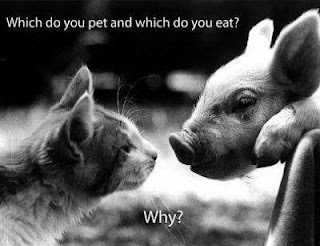
For many philosophers the central issue in addressing the subject of the moral status of non human animals is that of “sentience.” But what is sentience?
Sentience is defined as the capacity to experience episodes of positively or negatively valenced awareness. Examples of positively valenced episodes of awareness are thing such as pleasure, joy, elation, and contentment.
Examples of negatively valenced episodes of awareness are pain, suffering, depression, and anxiety. (See the Internet Encyclopedia of Philosophy, “Animals and Ethics”)
Utilitarian philosophy Jeremy Bentham argued that when addressing the issue of non human animal rights our central concern should not be whether or nor these animals speak, but whether they possess the capacity to suffer. In short, the debate concerning the moral rights of non human animals turns upon their capacity to suffer.
Because of their sentience, laws have been enacted in order to prevent cruelty to non human animals. Rene Descartes, the philosopher whose works marks the beginning of what has been termed as modern philosophy, argued against the idea that animals are machines which are devoid of an inner sense or consciousness as others would contend.
In addition to feeling of pain, it seems evident at this time that animals not only possess this inner sense or consciousness, and that non human animals also possess the capacity to suffer, but also experience other types of emotions such as fear and anger.
Another consideration in the debate concerning the moral status of non human animals emerges from the discussion regarding animal sentience. One concern centers upon the nature of cruelty to non human animals.
For example, the caging of animals or the keeping of animals as domestic pets would be considered cruel according to some. In addition another debate centers upon why we should not be cruel to these animals. A number of proposals have been presented as to why we should not exercise cruelty toward non human animals such as:
• Some believe that a major reason for not being cruel to non human animals is because of the effects on those who are cruel.
• Some believe that the reason we should not be cruel to non human animals is because the suffering of animals is bad for them.

